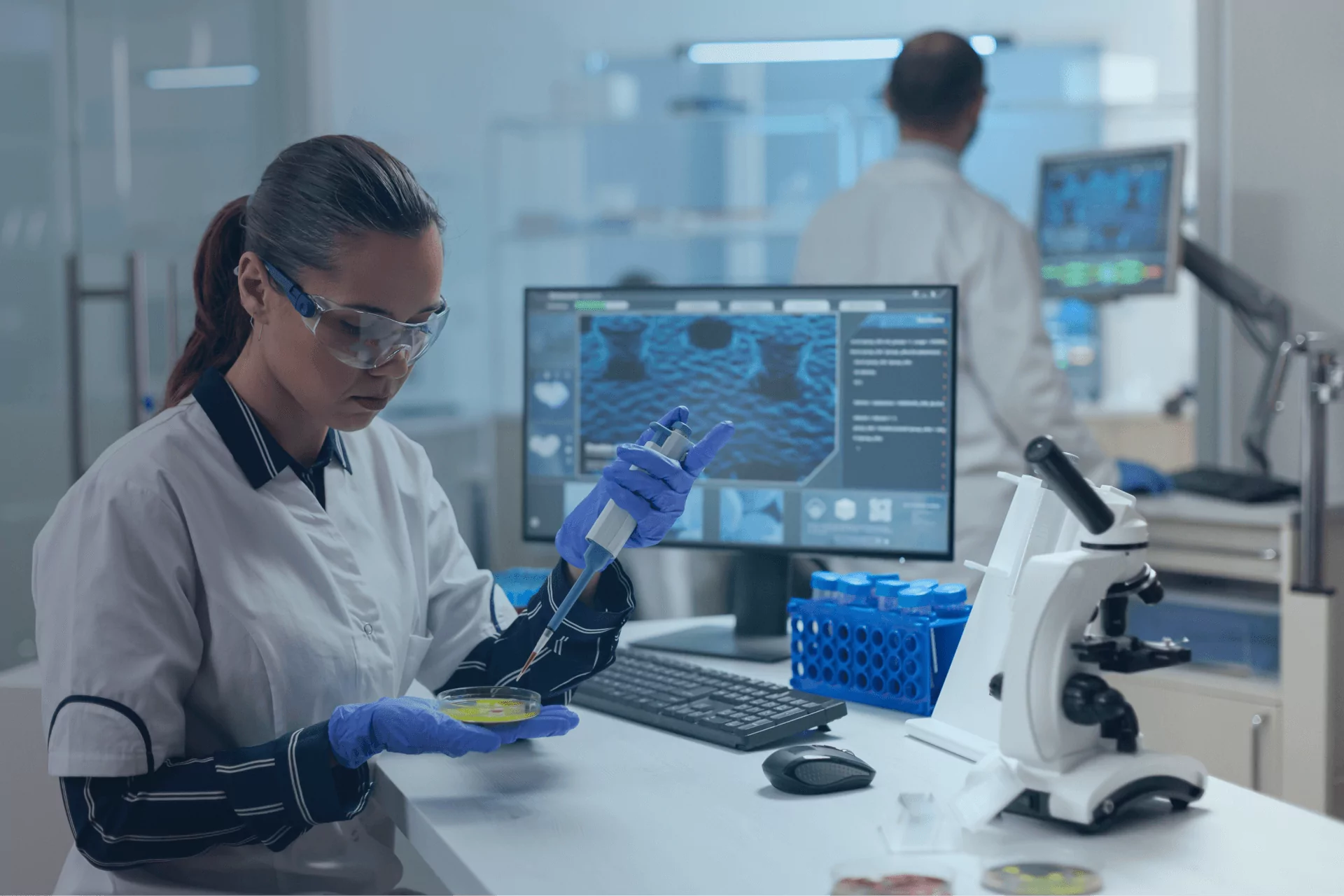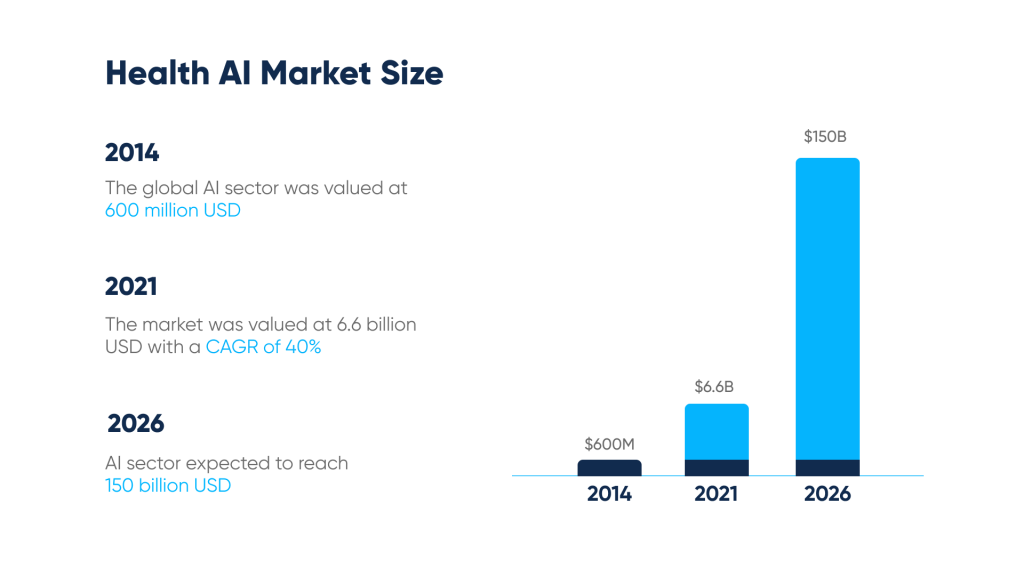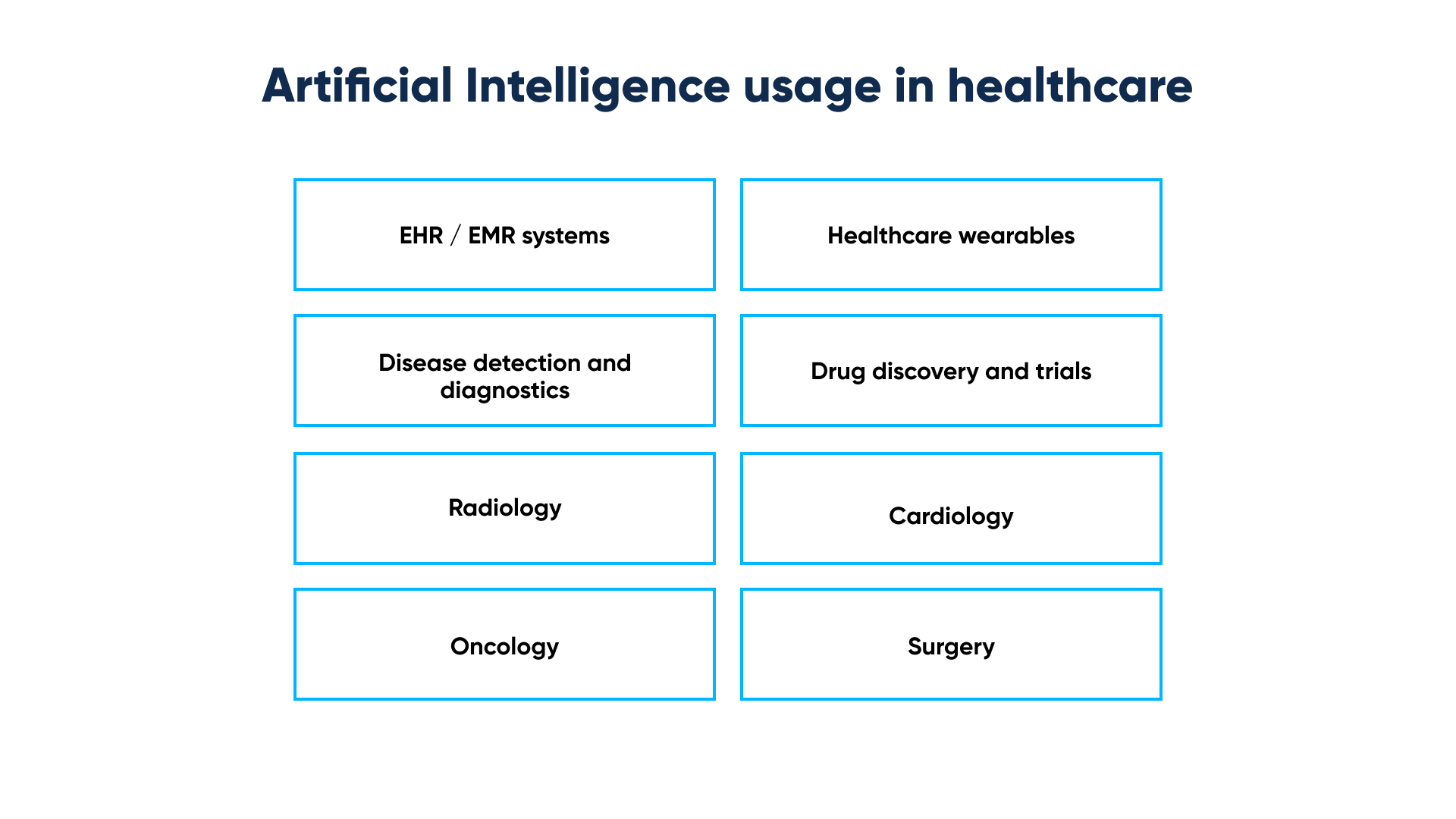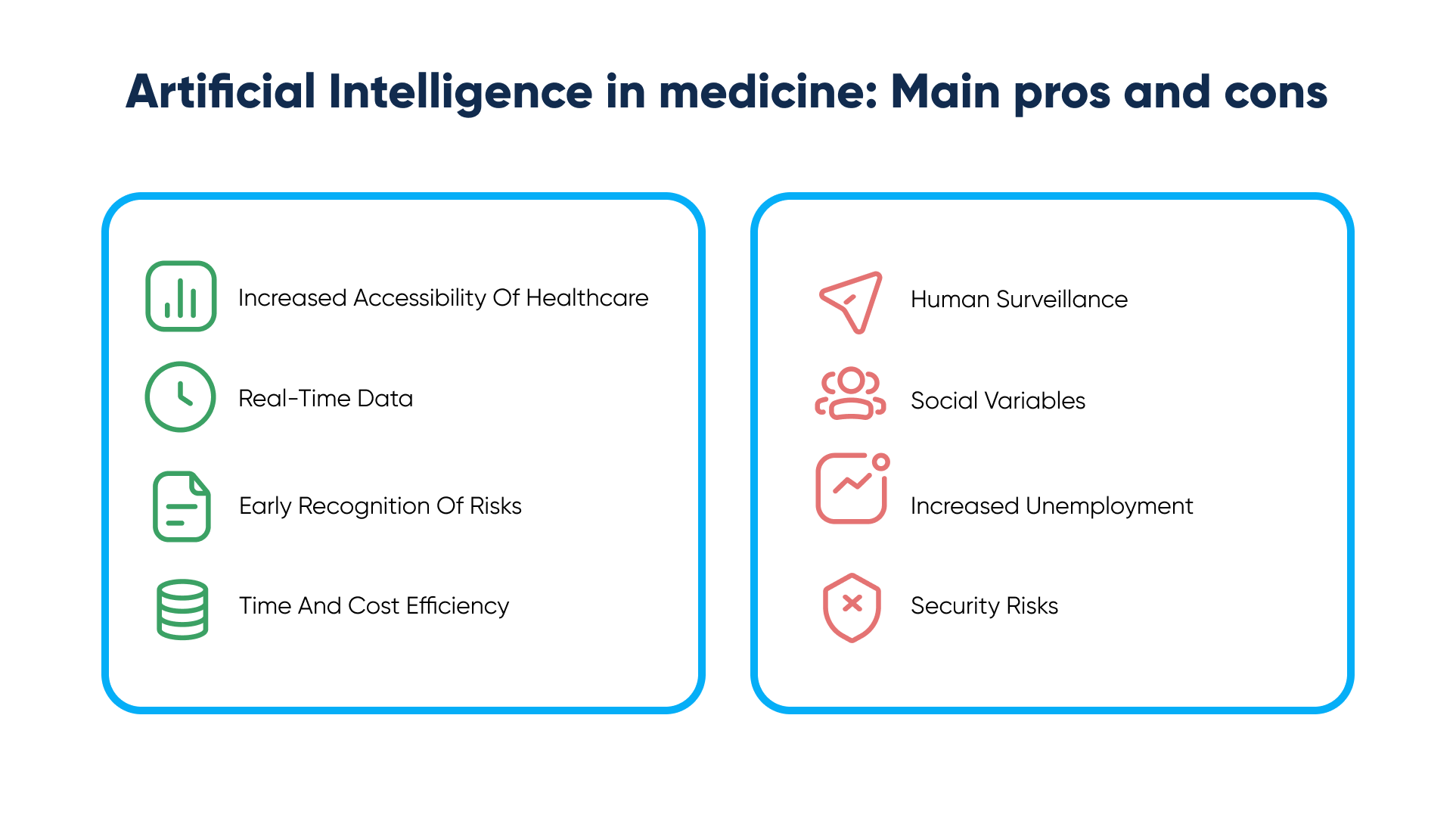How Is Artificial Intelligence Used in Healthcare Today?

Artificial Intelligence is a complex of technological solutions that allows simulating human cognitive functions. These functions include self-education, finding solutions without a set algorithm, and achieving logical insight.
The mentioned technological solutions include complex communicational infrastructure, software, processes and services aimed at data processing and analysis. The advances of this modern science are today being used in multiple different industries, including healthcare.
Artificial Intelligence in healthcare research 2022 and future market predictions
2021 has been a landmark year as we have seen an escalation in the rapid development of AI-technologies. Among the most important trends that were on the agenda – computer vision, machine learning and natural language processing.
2022 promises to be as eventful in terms of the incessant development and popularization of technologies, including AI. More and more organizations are investing in AI as one of the most promising fields today.
One of the largest international organizations to invest in AI is Microsoft. In 2020, they announced the launch of AI for Health, a 40 million USD, five-year program to support healthcare researchers in making public health more accessible for people and communities. But that isn’t the only initiative by MS to mention. A project called AI for COVID-19 launched just months later.
But what’s the future of AI? Speaking of dry figures, the global AI sector was valued at 600 million USD in 2014 and is expected to reach 150 billion USD by 2026.

Health AI market size, as by Accenture report. By Abto Software
The levels of AI
Below we will discuss the levels and types of AI. Turning to the classification, we think it’s crucial to distinguish between these two categories, which are sometimes mistakenly combined into one class.
Here’s the difference between the levels and types of AI in brief:
- When talking about levels, we mean the level at which trained machines can replicate human behavior. These are the steps along which Artificial Intelligence can develop.
- By types we mean smart machines from the point of their functionality, that is, the ability to solve specific tasks.
Artificial Narrow Intelligence (ANI)
Weak AI or ANI is the first level of AI. At this evolution stage, a machine performs only predefined functions.
This level includes the basic types of AI, which are reactive machines and so-called limited memory, a more complex type. Examples are biometrical and facial recognition, Siri, Alexa, and autonomous, self-driving cars.
Weak AI in healthcare is being used for:
- Administration automation
- Data acquisition and generalization
- Image interpretation
- Surgical assistance
- Diagnostic guidance
- Decision support
Artificial General Intelligence (AGI)
Strong AI or AGI is the second level of AI, a level that researchers have yet to reach. At this evolution stage, human-like machines should possess the ability to think and even make decisions based on their conclusions about the surrounding world.
Strong AI in healthcare can be used for:
- Precise radiology and pathology image interpretation
- Reasoning, strategizing and making thought-out decisions related to patient treatment
Artificial Superintelligence
Artificial Superintelligence is the last level of AI, only existing as a daring hypothesis. Having reached this stage, a computer should surpass human beings in their intellectual abilities.
If engineers will ever be able to get close to Artificial Superintelligence, smart machines might be capable of:
- Scientific creativity
- Social skills
The types of AI
Reactive machines
Reactive machines can perform the most basic operations. They’re designed to react with a certain output to a certain input and are not capable of learning. Such machines perceive the world directly. This means they can’t form memories and use past experiences.
A great example of this type of intelligence is the chess-playing supercomputer Deep Blue. In the late 1990s, the machine managed to beat the international grandmaster Garry Kasparov in just 37 moves.
Limited memory
Limited memory refers to the ability to process historical and observational data. This data is used to build empirical knowledge and make future predictions, as well as solve complex tasks.
One good example of this type of intelligence are Tesla’s autonomous cars. Those vehicles utilize machine vision cameras and sensors to track traffic participants and make future predictions.
Usage examples:
- Administrative and nursing assistance
- Surgical assistance
- Advanced diagnostics
- Decision support
and more!
It should be mentioned that almost every AI-solution utilized in modern healthcare refers to this type.
The theory of mind
The machines included in this category will in the future have to make inferences about the surrounding world. This means they will be able to understand that humans and animals have thoughts and feelings, and coexist with humans guided by this knowledge.
Self-aware machines
The last, final step would be building smart, self-aware machines. Such machines have to form representations about themselves, understand their inner state and predict human behavior.
How is Artificial Intelligence today used in healthcare?
EHR / EMR systems
Electronic Health Record and Electronic Medical Record systems play an important role in the journey towards healthcare digitalization. Using AI, hospitals, pharmacies and laboratories can automate day-to-day processes, which include data extraction, predictive analytics, decision support, clinical documentation, and more.
Healthcare wearables
Healthcare wearables are another important advance of the rapid digitalization in the healthcare industry. Utilizing AI, medical providers can help patients monitor health conditions and adhere to personalized treatment recommendations.
Disease detection and diagnostics
Artificial Intelligence helps clinicians:
- Analyze large volumes of patient data, including symptoms, genetic content and lifestyle
- Make more accurate conclusions
- Suggest treatments
- Predict risks
Drug discovery and trials
Artificial Intelligence is transforming drug discovery by helping:
- Identify new genome-wide targets
- Map novel disease pathways
- Identify novel binding sites
- Understand protein interactions, functioning and drugability
- Predict small-molecule structure relationships
- Analyze prospective protein targets
- Predict optimal synthetic routes
- Preselect drug leads based on properties
Radiology
Having a strong focus on advanced image analysis, Artificial Intelligence has been long showing good results. No wonder there are great expectations around applying the technology in radiology.
Some of the possible use cases of AI in radiology:
- Mammogram screening and interpretation
- Prostate gland and zone volume measurements
- Lesion detection and characterization
- Triage, detection and localization of pneumothorax, pleural effusion, alveolar syndrome, and more
Cardiology
Modern AI-based healthcare solutions can be applied in:
- Percutaneous Coronary Intervention (PCI)
- Aortic Valve Replacement (AVR)
- Cardiac CT
- Cardiac MRI
- Cardiovascular Imaging
- Interventional Cardiology
Oncology
Timely diagnosis and treatment of cancer remains an important challenge for researchers all over the globe. Applying AI in this healthcare field provides for effective screening, lesion detection, organ segmentation, specific disease feature and pattern characterization, as well as disease progression monitoring.
Surgery
One of the most important fields of application of AI-based advanced technologies in healthcare is surgery. Harnessing the many advances of natural language processing, machine learning, computer vision and artificial neural networks, healthcare professionals are decreasing surgical trauma and improving patient recovery.
Physical therapy and rehabilitation
Physical therapy and rehabilitation were traditionally always dependent on additional physical equipment. With modern-day computational technology, in particular artificial intelligence, expensive sensors and markers can be completely eliminated.
AI enabled pose detection and analysis might revolutionize:
- Digital therapeutics
- Digital rehabilitation
- Elderly care
- Sports medicine and orthopedics
- Prosthetic design and fitting
- Surgical planning, and other related domains

Artificial Intelligence usage in the healthcare. By Abto Software
Artificial Intelligence in medicine: Main pros and cons
The advances of AI in healthcare
- Increased accessibility of healthcare
Artificial Intelligence can be used to create a more efficient healthcare system. With smart virtual assistants, more people and communities will be able to monitor their health condition, understand symptoms and take necessary measures in a timely manner.
Health assistants like Ada help communicate with patients. The solution collects relevant medical information to provide health recommendations.
- Real-time data
Artificial Intelligence helps collect, store and instantly access medical records. With all the information accessible anytime, medical professionals recognize diseases at an early stage, make more accurate diagnoses, and prescribe the right treatment plans.
Some institutions are already implementing DeepMind, a solution by Google. The development helps clinicians access relevant patient information to make more accurate treatment decisions.
- Early recognition of risks
By collecting and analyzing important data on symptoms, diagnoses, medications, and unusual medical cases, AI-based solutions could be the answer to timely disease detection. By analyzing large amounts of information, smart systems can easily find matches and draw accurate conclusions.
One example is the Apple Watch. Utilizing AI, the wearable helps detect atrial fibrillation.
- Time and cost efficiency
AI offloads overwhelmed clinicians, allowing them to spend more time on patients. Covering registration, appointments, documentation and other operational processes, smart systems automate most of the administrative burdens and save production hours.
To name an example, the virtual health agent by SmartAction is helping medical institutions save resources. The assistant covers authentication, scheduling, billing, and more.
The pitfalls and limits of AI in medicine
- Human surveillance
Artificial intelligence has not yet reached the level to surpass us humans, therefore, it needs observation.
- Social variables
Artificial intelligence isn’t able to observe human behavior and various social peculiarities, which can be a potential obstacle in providing medical care.
- Increased unemployment
The introduction of AI may make certain jobs less desirable or even completely unnecessary.
- Security risks
The utilization of AI requires more security control, as there is a serious threat of a targeted cyberattack.

The advances and limitations of Artificial Intelligence in medicine. By Abto Software
The future of AI in healthcare
Today, the biggest challenge for the mass implementation of AI in medicine is not the problem of functionality, but rather the problem of adapting advanced technology in daily routine processes. Smart solutions must be governmentally approved, medically standardized, and taught to clinicians.
Experts believe that the best strategy for the smooth implementation of AI in healthcare is the hybrid model. Smart assistants cannot replace medical professionals, but should facilitate certain work activities and augment the efforts of clinicians.
One advancement that’s quickly gaining momentum is the rising digitalization of traditional physical therapy. Computational technology, in particular computer vision, is reimagining most outdated, inefficient approaches of traditional physical therapy and rehabilitation.
AI based pose estimation and analysis benefits both:
- Healthcare professionals
- Individual patients undergoing rehab
The branches of AI
Machine learning
Machine learning can be explained as:
- a branch of AI studying methods of building sophisticated algorithms, which make computers capable of learning, including supervised, unsupervised and reinforced learning techniques;
- a section of AI exploring methods allowing computers to improve their performance using experience.
In 2016, Google Cloud and MIT Technology Review conducted a joint study and interviewed 375 respondents from small and large companies. They have found that 60% of companies surveyed are taking advantage of machine learning.
The global machine learning market is growing rapidly. Since 2016, its volume has reached over 1 billion USD, and is projected to reach 40 billion USD by 2025.
By utilizing machine learning businesses can:
- Forecast demand, sales volume, warehouse filling
- Identify trends, weak and growth points, anomalies, patterns
- Recognize photo, video, audio content, attempted fraud, internal and external threats
- Automate administration
- Classify and segment customers
- Develop chatbots
Expert systems
Expert systems based on if-then rules were a popular technology back in the 1980s. In healthcare, such systems have been used for clinical decision support purposes and are still being utilized by some institutions in their electronic health record software.
Expert systems require careful configuration of if-then rules and supervision. They are very easy to implement and allow automating certain internal processes. At the same time, such systems can break if too many rules are set or if these rules are conflicting. That’s why this technology is gradually being replaced by more advanced solutions.
Natural language processing
Natural language processing (NLP) is a growing subfield of AI, computer science and linguistics, which helps automating processes such as speech recognition, text analysis, literal translation and even mood recognition. According to Mordor Intelligence, the global NLP market will be valued at over 48,46 billion USD by 2026.
In healthcare, NLP is already being actively utilized to cover:
- Clinical documentation
- Review management
- Prior authorization
- Risk adjustment
- Clinical decision support
- Clinical trial matching
Robotics
Robotics deals with development of automated computer systems. Robotics professionals develop algorithms to automate technological processes and operations, including operations that are too complex or dangerous for people to perform.
Robots are already being actively utilized in healthcare:
- Robot surgeons are assisting in performing precision operations
- Robot caregivers are dispensing scheduled medication and provide medical care
- Exoskeletons are restoring mobility to people with disabilities
- Simulation robots allow students to practice important skills
How we can help
Harnessing the many advances of today’s cutting-edge technology, Abto Software delivers custom AI solutions. We provide business analysis and consulting, data preparation, model creation and evaluation, AI development and deployment.
With deep technological knowledge and experience, our engineers make sure the client automates important administrative processes, improves monitoring as well as the quality of patient care, and extends his business. We have experience in AI research, including machine learning (ML) and deep learning (DL) algorithms, computer vision (CV), and natural language processing (NLP).
Abto Software’s services include:
- Business automation (including CRM & ERP systems)
- Telemedicine and telehealth solutions (for example, smart chatbots for delivering at-a-distance medical care services)
- Predictive analytics (enterprise tools for discovering data patterns and making accurate predictions)
- Recommendation systems (including EMR & EHR systems)
and more!
Don’t wait to introduce secure and impactful solutions to make more of your business!


